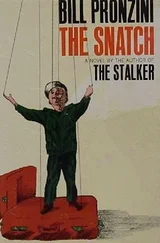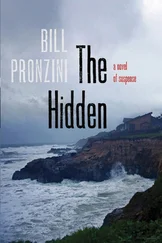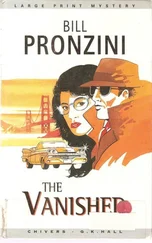Bill Pronzini - The Stalker
Здесь есть возможность читать онлайн «Bill Pronzini - The Stalker» весь текст электронной книги совершенно бесплатно (целиком полную версию без сокращений). В некоторых случаях можно слушать аудио, скачать через торрент в формате fb2 и присутствует краткое содержание. Жанр: Старинная литература, на английском языке. Описание произведения, (предисловие) а так же отзывы посетителей доступны на портале библиотеки ЛибКат.
- Название:The Stalker
- Автор:
- Жанр:
- Год:неизвестен
- ISBN:нет данных
- Рейтинг книги:4 / 5. Голосов: 1
-
Избранное:Добавить в избранное
- Отзывы:
-
Ваша оценка:
- 80
- 1
- 2
- 3
- 4
- 5
The Stalker: краткое содержание, описание и аннотация
Предлагаем к чтению аннотацию, описание, краткое содержание или предисловие (зависит от того, что написал сам автор книги «The Stalker»). Если вы не нашли необходимую информацию о книге — напишите в комментариях, мы постараемся отыскать её.
The Stalker — читать онлайн бесплатно полную книгу (весь текст) целиком
Ниже представлен текст книги, разбитый по страницам. Система сохранения места последней прочитанной страницы, позволяет с удобством читать онлайн бесплатно книгу «The Stalker», без необходимости каждый раз заново искать на чём Вы остановились. Поставьте закладку, и сможете в любой момент перейти на страницу, на которой закончили чтение.
Интервал:
Закладка:
He understood; he understood all too well.
But it didn’t really matter now, because the money had finally run out—there was exactly three hundred and sixteen dollars in their joint checking account—and because Andrea had run out, too.
Andrea, he thought. He stared blankly through the smoke curling upward from his cigarette. Andrea, why? Why? We had something, didn’t we? We had it all, didn’t we? We had a love that transcended all the failures, all the empty purposes, enduring, unshakable, unkillable, a veritable Rock of Gibraltar ...
Bullshit
It was the money, of course.
Face the truth, Kilduff—no more money, no more Andrea; simple enough, painfully simple enough. He should have seen that, even though they had never discussed the money by tacit agreement; he had told her in the beginning that it was an inheritance from a non-existent granduncle Andrew in Cedar Rapids; Iowa, and she had accepted that. That was where he had made his mistake, taking her unquestioning acceptance of the money and her silence on the subject to mean that it carried no real import for her. But all the time she had been waiting, biding her time, squeezing all but the very last little drop.
And then: Good-bye, Steve. In absentia. It was nice while the money lasted.
Bodega Bay is a small fishing village on the Northern California coast, some sixty-five miles above San Francisco. The village, the goodsized inlet of the same name, and a complex of several buildings called The Tides, achieved a kind of national prominence some years ago when Alfred Hitchcock filmed his suspense movie The Birds there. Since that time, they get a good percentage of tourist business in the spring and summer months—sightseers, vacationers, visitors from outlying towns, self-styled fishermen who boast to the bored party-boat captains about the record king salmon they are going to land but never do. But during the winter, the natives usually have the place pretty much to themselves, and it takes on—falsely—the atmosphere of one of those staid, aloof New England-seacoast hamlets.
At The Tides, inside the Wharf Bar and Restaurant, Jim Conradin sat in solitary silence at the short bar, drinking two fingers of bourbon from a water glass. All of the burnished copper-topped tables in the coffee shop area were empty. Sal, the bartender, was having an animated discussion with the lone waitress, a young girl named Dolly, with hair the color of wheat sheaves and very large breasts which Sal watched hungrily as he spoke. There was no one else present.
Conradin, dressed in a sheepskin jacket and blue denim trousers, turned on his stool to look out through the windows with deep-set, brooding gray eyes. The chiseled, weather-bronzed features of his lean face were grim. A storm was building somewhere out at sea—a day, perhaps two, away; the vague smell of dark rain had been in the air when he arrived at The Tides some two hours earlier. The bay was rough, an oily grayish-black color; whitecaps covered its surface, causing the red-and-white buoys that marked the crossing channel to bob and weave violently, and three or four high-masted fishing boats anchored downwind to rock heavily in the swells. He couldn’t see much of Bodega Head, across the bay, and the narrows that led into the Pacific at the southern end was completely obliterated by swirling fog. Old man Rushing, who had been a sailing master once and had come around Cape Horn in a two-masted schooner in 1923, sat dressed in his perennial faded blue mackinaw and leather deer-hunter’s cap on the edge of the wooden dock, fishing for crappies with a hand line, impervious to the cold and the fog and the wind. It seemed to Conradin, as it always did when he saw him, that the old man had been built, too, when they constructed the dock.
Conradin turned back to his bourbon, staring moodily into the glass. He hated winter, hated it with consummate vehemence. It was a sedentary time, a time of waiting, a time of thinking. God, that was the worst part—the thinking. When the salmon were running, it was a different story altogether. Then you could stand on the solid hardwood deck of your boat in a three-mile-per-hour troll, with the warm sea breeze fresh and heady in your nostrils and the sound of the big Gray Marine loud and vibrant in your ears; you could feel in your hands the power, the resiliency of a thirty-pound hickory-butted Hamell rod with a 4/o reel and a fifty-pound monofilament test line; you could see the big silvers close out on the green-glass ocean, coming out of the water in long graceful jumps to rid themselves of sea lice, the way marlin will do to shake the sucking fish from their gills; you could watch them, feel them hit the Gibbs-Stewart spoons or the live sardines, whichever you were using, leaping end over end and then turning and running toward the boat, broad tails lashing the water to foam, then sounding to take the line out again; you could play them, fight them, pit raw stamina against raw stamina, know the exhilaration of landing them, of winning, of taking them with their shining bluish-silver bellies onto the ice. There was no time for thinking, then, no time for dwelling on a past that refuses to stay buried. But in the winter...
Conradin drained the balance of the amber fluid. He debated having another drink; he had had four already, and he could feel them just a little. It was barely noon, and Trina would have lunch for him before long, in the big white house overlooking the bay from the northern flat. Still, there was time for one more; there was always time for one more.
He glanced toward Sal, the bartender, who now had his face very close to Dolly’s, whispering something in her ear. She giggled girlishly, her face reddening. Conradin said, “How about a refill.”
Grudgingly, Sal moved away from the girl to pour two more fingers of bourbon into the empty glass. When he took Conradin’s dollar, his eyes said that anybody who drank ten fingers of sour mash before noon was a goddamned lush, or something.
Trina might have agreed with that, in a way; Trina said he drank too much, and maybe she was right. But only in the winter, he thought, only when there was the time for thinking.
Silently, he raised the glass to his lips.
When Larry Drexel brought his sleek jade-green Porsche 912 SL to a stop in the driveway of his tile-roofed hacienda-style home in Los Gatos, he saw that Fran Varner was waiting for him on the rear patio. She was propped up on one of the chaise longues near the stone fountain in the patio’s center, reading a paperback book. A bulky-knit sweater was draped over her shoulders, and the short sky-blue skirt she wore had hiked up to expose her slender legs to a pale November sun which danced intermittently behind heavy clouds. Her rich seal-brown hair was carefully combed, curved under at the nape of her neck, the way he liked her to wear it.
Drexel smiled a little as he set the parking brake, thinking that if he had somehow been crazy enough to marry her, as she had been after him for six months to do, then she would be greeting him when he came home from El Peyote—wrapped in a shapeless housecoat, with her hair up in rollers. This way, with the arrangement, she was always at her best for him—even when they were in bed, especially then, putting that cream sachet he liked in all the secret little places and sleeping in the nude instead of in the old flannel nightgown he knew she wore at her apartment.
Dark-haired and dark-complected, looking somewhat like the actor Ricardo Montalban though he was not of Latin descent, Drexel stepped onto the flagstone walk that paralleled the house. He moved with almost feline fluidity inside his two-hundred-dollar sharkskin suit, following the path past the bottle brush and barrel cactus in the landscaped borders. When he reached the patio, his eyes—black, expressive, sharply watchful—moved approvingly over the rows of macetas with their potted desert plants, the four asymmetrical Joshua trees like miniature Briareuses, the six-foot stone and mortar wall separating the patio from the narrow creek that wound its way past the rear of his property. It had an Old-Mexico feel which never failed to please him; he had a thing about Mexican-Spanish architecture and motif.
Читать дальшеИнтервал:
Закладка:
Похожие книги на «The Stalker»
Представляем Вашему вниманию похожие книги на «The Stalker» списком для выбора. Мы отобрали схожую по названию и смыслу литературу в надежде предоставить читателям больше вариантов отыскать новые, интересные, ещё непрочитанные произведения.
Обсуждение, отзывы о книге «The Stalker» и просто собственные мнения читателей. Оставьте ваши комментарии, напишите, что Вы думаете о произведении, его смысле или главных героях. Укажите что конкретно понравилось, а что нет, и почему Вы так считаете.












